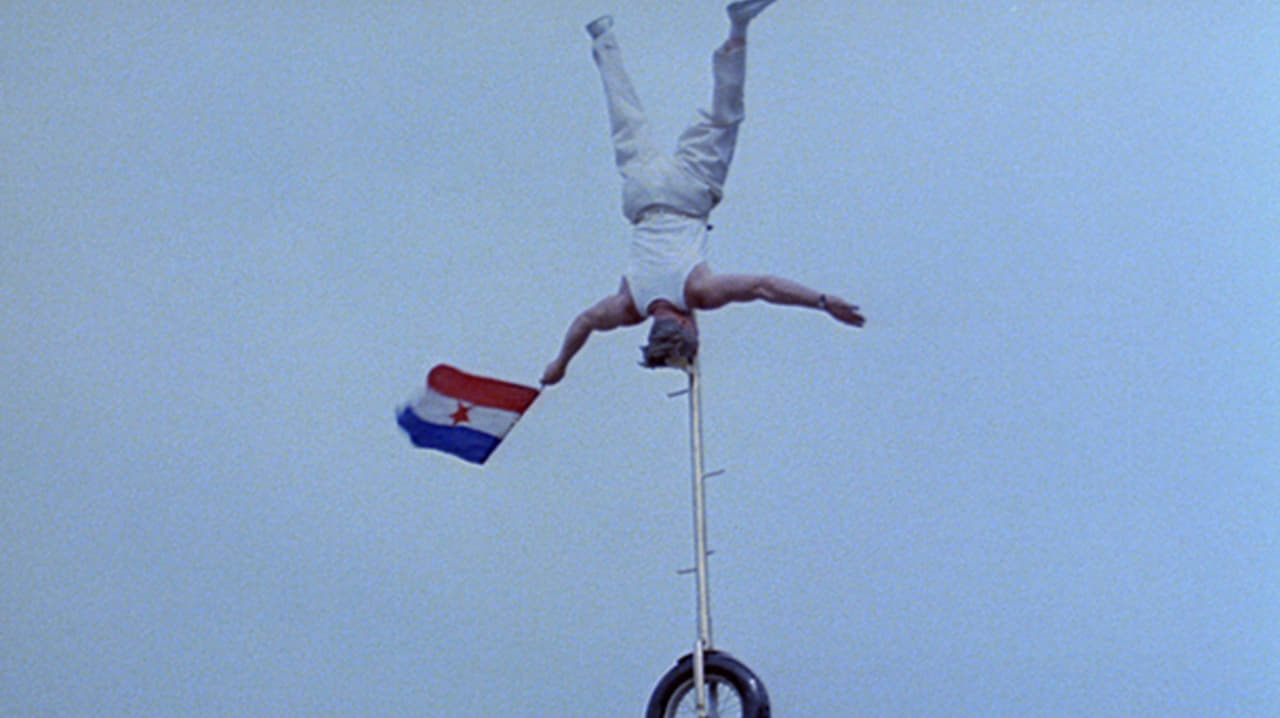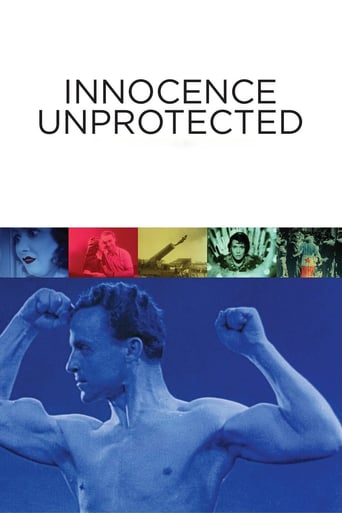

Three old men standing together atop a roof. They stare into the crowds of everyday citizens below, reminiscing in their own sad, quirky way. "Everything's changed except us." one of the men says profoundly and without pretension. Years upon years ago, these three men were involved in the production of a "classic" Yugoslavian film, which happened to be unfortunately made during the Nazi occupation.This bizarre and occasionally surreal odyssey is unlike almost any other film ever made. Combining a slyly mocking reconstruction of a cheesy old melodrama, a portrait of the quirky characters involved in making said melodrama, a melancholic look at the damaged politics of the time in which this melodrama was made, and a sometimes harrowing and often inspiring biography of the melodrama's acrobatic star. All of these elements clash together to create a wonderfully weird small scale epic that is as hilarious as it is sad and as harrowing as it is happy. This film about a film is simply too strange to miss, and it is also too GREAT to miss. The Yugoslavian filmmaking mastermind Dusan Makavejev seems to be the only filmmaker in history to be able to pull such a concept off and have it be an endlessly entertaining, poignant, and humorous work of art.
... View MoreWow, I've only recently discovered Makavejev and this is his most mind-blowing so far. In simple terms what this is, he finds an old Yugoslav film from the 40s and goes on to wrap his own around it by showing footage from that film, archive footage of the time, all the while interviewing the cast and crew in their old age as they walk around Belgrade reminiscing.Superficially, this lets him offer a portrait of a country and the change of times. But there's much more here.That film, the first talkie in the country, was banned by the communist government for no other reason than it was made and shown during the occupation so in some commissar's mind it had to be collaborationist and reactionary. The filmmaker was tried for treason but acquitted. The film was in fact the silliest thing. Essentially a vanity project of its maker who was also the main star, a strongman who performed various 'impossible feats' around Yugoslavia at the time, (freeing himself from chains while suspended in a box high in the air etc).Far from anything ambitious, it's a tawdry melodrama where an innocent maiden declares her undying love for him, whose 'feats' we see as her daydreaming about how marvelous and strong he is and later as he valiantly rescues her from an old creep.Make no mistake, Makavejev is making a deeply layered political film but so different from the norm.The norm would be for example an act of noble defiance exposing some overwhelming cruelty. Think of Spielberg's film where a beautiful horse gallops through horrible war. Mawkish. Here the act of defiance is the making of a film that meant nothing of the sort, it's not the story of some noble representative of the people but a buffoonish entertainer, but nonetheless stands as humorous token of creatively defying gloom and defeatism. And the cruel opposition unmasked in the process is what? A communist regime who'd be so stupidly totalitarian as to ban this obviously goofy film we see. So how marvelous that we find out that the man isn't wiser in his old age, he's still the same lovely fool flexing his muscles for the camera, loving the attention. That one of his main attractions, the human cannonball, was inspired by an old Soviet film, footage of which we see. That people died as a result of it. That when a 'New Serbia' is announced in a newsreel title, we're not sure if the newness refers to the occupation or the liberation. That we see, near the end, what became of our own quixotic hero in his quest to impress people. And that it is all accepted as a nice story to tell, without misery.This is marvelous stuff.All these plates spin together — the film-within as the tawdry thing it is, as the vain self image still carried now, and elevated as token of expression in an oppressive state and victim of another. The man in his old age performing his reckless stunts holding a Yugoslav flag, the image emblematic of foolishness, vanity, achievement, dream, all being simultaneously present in the image. I place it on par with F for Fake and The Last Bolshevik. You couldn't ask from Herzog for a better film on cosmic folly.
... View MoreInnocence Unprotected is the title of the film that Dusan Makavejev is making, and also the title of the movie that the movie is about. It's a unique documentary, and not just because of Makavejev's approach of (suffice to say) non-linear editing style and taking apart various forms of documentary into one whole. It's actually not that much different than his first two films, except that here he's not directing the melodrama part of the film but sampling it (a lot) from the original film written/directed/produced/starring Yugoslavian strongman Dragoljub Aleksic.Saying exactly what it's 'about' would be a little wrong. On the surface, it looks to be about the making of the first Yugoslavian 'talkie' in 1942, during the German occupation without the Nazis knowledge of its production, and also its star and focal point Aleksic. Aleksic is one of those natural real-life characters, someone you'd love to meet for five minutes and maybe (or maybe not) want to stick around with. He was a cheerful, amiable narcissist who did lots of strongman things like lifting incredibly heavy objects (usually from his mouth), and dangling from very high places like tall buildings and flying airplanes. We learn that after years of having his associates film his performances, he decided to make an actual movie to accommodate a good lot of this footage (some of it, and I'm not making this up, him just flexing his muscles and singing on camera).Along with interviews with surviving cast and crew members, and also Aleksic himself- who seems to always speak in the same "I shall now do this with my such and such dangling from a high-bar" tone of voice like a B-level Marvel comic hero- we see many clips from 1942 film. Seeing this is a real delight, since it's a completely, lovingly asinine melodrama where a girl is in such love of Dragoljub and goes on and on about his daring-do even when the girl's jealous guy is after her and ready to take apart the strongman. It's the kind of melodrama with one-note performances, usually in one-note speak, and at best competent and at worst horrid editing movements (there's even a laugh-out-loud moment in seeing Aleksic "swinging" from one building to another in a really bad model make-up).Makavejev allows us to enjoy this adulatory fluff for Aleksic, because it is so pure an effort, not a truly bad effort but one made with naivite. This is a wonderful counterpoint to footage spliced in from destruction during world war two, tanks rolling into town and buildings falling from gunfire, and then, eventually, we learn that the film Innocence Unprotected was banned for a few years because it was such an affront to the government- a talkie black and white home-made picture for the people, shown at The People's Cinema, as opposed to a German color movie- and how that battle was one. And while Makavejev fixes the style as a character unto itself, the way that we see some scenes in the old movie colorized, it's really, intriguingly, about this guy Aleksic.He's a natural at what he does. He swings high and balances himself with ease, and even after he was told after a bad accident that he would have to wear a metal corset forever he still does daring-do for the camera and for those interested. He commands attention when he's on screen, either talking or doing his wild physical acts. It's a hybrid history lesson, homage to melodrama, and a profile of a pure, simple talent-cum-folk-hero, with some characteristic politics and war thrown in, and it's one of the director's best.
... View MoreApparently a metaphor for Yugoslavian politics and society circa 1968...you couldn't prove it by me, but that's besides the point. Makavejev was interviewed following a showing on the Sundance channel, and explained that he stumbled on a Yugoslavian film made by a noted strongman and aerialist during the German Occupation (WWII for those born after 1950), and then unearthed years later from its hiding place. It turned out that many of the cast and crew were still living in the 1960's, so he fashioned a wrap-around story about a director making a documentary intercutting the original film and German and Yugoslav news footage from the same period with present-day interviews with the original cast (Pirandello, anyone?) The metaphors are impenetrable for those outside the society, but the footage of Alexis the strongman doing his stunts both then and now is quite thrilling, the original film footage is charmingly naive and the newsreel material is shocking. Film as pure sensation, with some marvelous and perhaps unintentional humor. Well worth 90 minutes of your time, particularly when you compare it to your nabe's current listings....
... View More